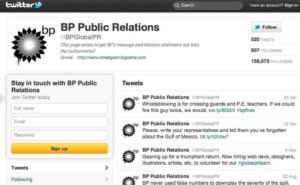Parody Twitter Accounts: Friend or Foe?
 Posted At: March 7, 2012 1:45 PM
Posted At: March 7, 2012 1:45 PM
by Katie Kallam
What do the Queen of England, Suri Cruise and Chuck Norris all have in common? They each have vast amounts of Twitter followers, and yet they’ve never logged on.
As the popularity of the microblogging phenomenon, Twitter, has risen, it has become a necessary marketing tool for celebrities, companies and PR professionals. However, many users have started getting more creative with its use.
Parody accounts of celebrities and fictional characters have gained large followings because of their humorous observations or satirical jabs. But do these parody accounts help or hurt? Sure, they help increase brand recognition, but is it the right brand they’re promoting?
According to Twitter’s Parody Policy, users are permitted to create parody, commentary and fan accounts; however, they must follow strict guidelines. Usernames and profile names for parody accounts cannot be the same name as the subject of the parody. They also cannot mislead other users about their true identity. Twitter advises its users to check if an account is verified before trusting it as the actual source.
While remaining within the guidelines set by Twitter, parody accounts can still cause harm to brands. According to an article by Discovery News, one of the earliest and most prominent parody Twitter accounts is @BPglobalPR. This account “claimed to be British Petroleum’s public relations department during [2010’s] massive oil spill in the Gulf of Mexico.”
The account now has more than 150,000 followers and spits satire such as “Please do NOT take or clean any oil you find on the beach. That is the property of British Petroleum and we WILL sue you.” This parody portrays BP execs as out of touch, insensitive and inept, increasing the public’s already poor perception of the way they handled the Gulf oil spill.
PR professionals should be aware of how parody accounts can harm the brands they represent by following them and then addressing issues brought up by the parody accounts. The official, verified British Petroleum Twitter account, @BP_America, gives followers the opportunity to stay up to date on what BP is doing in the Gulf and through climate change. Despite this effort on BP’s part to counteract the negativity of @BPglobalPR, it still has approximately 100,000 fewer followers than the parody account.
Parody Twitter accounts can also be a source of information. According to an article by RedZebraWorks blog, “viewing a parody account informs the reader of all activities taking place for the corporation—and none of the information is sugar coated. Rather than searching through news sites, viewers can simply click on articles within tweets to learn more.” Twitter users feel as though they are getting the no-holds-barred information when reading a parody account.
Because of this, corporations should overcome the snarkiness and humor to tap into the PR potential of these accounts as ways to reach their audiences or even start their own parody accounts. For example, Coca-Cola, in addition to its main corporate Twitter account, has created an account for Doc Pemberton, the long-deceased inventor of Coca-Cola. This account uses humor to promote Coca-Cola from the perspective of its old-fashioned inventor.
Parody Twitter accounts can help, hurt or even confuse an audience. That is why it is important for PR professionals to be aware of their influence to counteract their negativity or tap into their potential to reach new audiences.
Opinions
Comments are closed.





Post comment
Twitter is overtaking the social media world. All kinds of accounts are going to emerge from this kind of popularity. I follow many parody accounts about sorority life, college life and even white girl problems. These accounts provide humorous insight, but are meant for entertainment not reliable information.
I have never though about those parody accounts actually helping a company. Though it is an interesting point, I think it can cause much more harm than help. I have even seen a few accounts like @NotTheCrimsonWhite and @TheCrimsonWhite get a little bit heated.
I really enjoy my Twitter for the most up to date information, and news. The parody accounts are just for fun but I do not really take them seriously and I am not sure anyone else should be taking them to heart either.
PermalinkPost comment
This article touches on something I find to be very relevant on college campuses. As a student at The University of Alabama, my Twitter feed is filled with friends re-tweeting parody accounts claiming to be the UA First Lady, Denny Chimes, Not Crimson White (our school newspaper) and even Chancellor Dr. Witt.
Normally, I’m not phased by the comments these Twitter accounts blast, as they are dripping with sarcasm and humor. But recently, my opinion changed. As students campaigned for Student Government, the parody accounts took advantage of the sensitive political atmosphere, claiming to be various candidates.
We can all take a joke, and everyone knows there will be disagreements in politics, but it is important to be aware of whether you’re crossing the line. Twitter has a lot of power: quick messages can be blasted to massive audiences instantly. Because of this beneficial feature, much harm can be caused. I think it’s important for people to be conscious of harm and ill effects their messages can cause on Twitter, and to avoid being caught up in the thrill of gaining followers for cheap stabs and brutal jokes. Twitter is a powerful tool, but with that power comes great risk.
Permalink